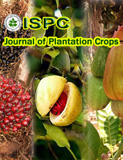Characterization and classification of coconut-growing soils of Maddur, Karnataka and comparative evaluation of their suitability towards tender coconut production
DOI:
https://doi.org/10.25081/jpc.2020.v48.i3.6627Abstract
A study was conducted along the coconut-growing soils of Karnataka to assess the potential of soils and consequences towards tender coconut production and marketing system. Major coconut-growing soils across the different agro-climatic zones of Karnataka were investigated for their development by studying the soil profiles. It was observed that the soils are moderately well to well-drained, moderately deep to deep black, gravelly or non-gravelly red loamy and clayey in central, eastern and southern dry, southern transitional and coastal zones, with good water holding capacity and medium to high fertility. Soils in Maddur were characterized and classified in this study. It was found that the soils in Maddur are deep, well-drained, gravelly clayey with low available water capacity on undulating inter-fluves, with moderate erosion, classified to clayey-skeletal, mixed, semi-active, isohyperthermic Typic Rhodustalfs at the family level and found to be ideal for tender coconut cultivation due to better rainfall distribution, suitable temperature, the elevation of the area, rooting conditions, moisture availability to roots, favourable soil reaction, higher base saturation, N, K and B levels along with gravelly clayey sub-soil and gravelly sandy loam surface texture.










 .
.